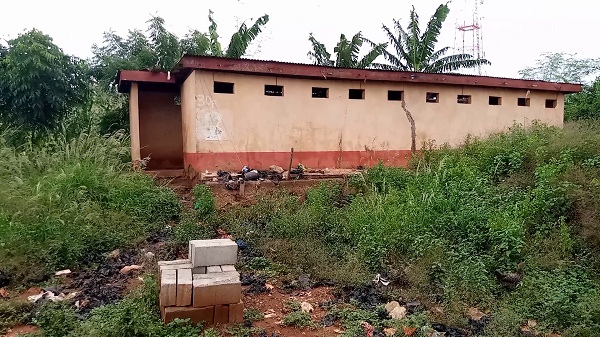At Kodjonya in the Eastern Region, the simple act of relieving oneself is fraught with danger in an area where population density is high, and the only public sanitation amenity is crumbling.
With the vast majority of the houses here not equipped with sanitation and water facilities such as household toilets, they have no option and therefore forced to depend on this horrible, 30-year-old public toilet facility.
An unbearable stench from the 20-seater toilet greets the nostrils of residents who still depend on it, predisposing them to a potential health hazard, forcing them to hold their noses and frown at the naked sight of slush of faeces.
Although monies were collected from users in the past, the state of the structure betrays the use of these monies.
Some portions of the roof covering the three decade-year-old building are off and the structure exposes users to the mercy of the weather.
Despite the poor maintenance and foul smell, it has not stopped poor residents with no option from using it as some people were seen going into the toilet at the time of our visit.
Open defecation, is however on the rise here as affected residents opt to ease themselves in nearby bushes and open spaces rather than the existing facility.
The female structure which was in a worse state has been closed down, forcing its managers to partition the male side into two to be used by both males and females.
Meanwhile, Assemblyman for the Kodjonya Electoral Area, Gabriel Tettey described the toilet as a death trap.
“…this area has no toilet apart from this one, for the past two years, this toilet has been in a most deplorable shape, actually, it’s a death trap,” said the Assemblyman.
According to him, efforts made at Assembly meetings and persistently bringing this to the attention of the Lower Manya Krobo Municipal Assembly to fix the sanitation challenges have yielded no results.
The closest the Assembly came to addressing the problem is a foundation laid close to the existing facility towards the construction of a new one.
Unfortunately, this has not materialized due to land litigation over where the new facility is intended to be put up, stalling the project abruptly.
Mr Tettey said though a new site has since been acquired for the project, nothing has been done, forcing the residents to resort to the backward, practice of open defecation.
“Now we don’t have a toilet in the area and it has resulted in open defecation and it’s a challenge which can bring a lot of diseases to the area,” said the Assemblyman.
Health experts have said unsanitary acts increases diarrhoea besides exposing the environment to contamination and diseases.
A resident, Michael Akwetey admitted resorting to open defecation but added that he had no options.
“Previously, I used this facility but I now resort to the use of the bushes because of the current state of this place of convenience and the landowners do not allow us to ease ourselves on their lands,” he said.
According to a UNICEF report in 2017, Ghana loses an average of $79 million annually due to open defecation.
Ghana is classified among 34 countries with the highest open defecation rates of 15 per cent and above.
Nineteen per cent of the total population practices open defection daily translating into one out of every five people practising it in the country.


